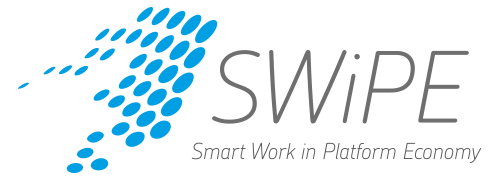
A mother goes to a park for the day with her children. She can forget her bag and her wallet; she needs only her phone. The trip takes but moments on an Uber. As the children are playing, hunger strikes, and mom orders nutritious, organic, meals through the spoonrocket app. The food arrives almost instantly. When it’s time to dial down the running around, mom orders drawing materials from the PostMates courier service.
This kind of everyday life is possible – in Sillicon Valley. There, one has a big enough market and a concentration of creative designers and programmers, who can combine GPS positioning to a clever idea and an engaging user experience. Ordering and paying happen right from the app. Your courier or car can be followed every step of the way. These are new platforms where the customer and deliverer of a service are brought together with a few taps.
The catchphrases of this new reality are platform economy, the uberization of everything, the internet of everything (IoE), smart cars, wearable sensors, automation and robotics. Fast services, a life of ease and convenience. Everybody wants this!
Can all work be servicized through platforms and uberization?
Why couldn’t we apply the principles of uberization to ordinary work in organisations or perhaps to public services? What kind of service would archiving be if it was an uber service? What would primary school be like if it was an uber service? Or what would elderly care be as an uber service?
Then, would the following ideas have any merit? Parents who want tutoring for their child could use the “SpeedTeach”-app to order someone to attend their child in school. How about a busy family member who does not have time to visit a grandfather suffering from memory loss? He could use the “BeCaressed”-app to have a cuddly robotic seal placed in his lap.
Hang on…. For who is the service care free? From who’s point of view has everyday life become easier? Life can be easy in the paradise of digital services, but for whom is it a good life?
Work in the platform economy can be a supplement or the only way to make a living
Uber-type services and the platforms that enable them seem to succeed best in places where there are lots of the rich and enough of the poor. Those that do well are the winners in the market for instant gratification. Instead of technology, the most important success factor may be an unequal society. No surprise then, that the union movement views these developments with a degree of suspicion. Also, it is clear that this global phenomenon will not stay outside Finland.
Platform work is already in Finland. For many platforms provide a sensible way to supplement their income and flexibly fit work around life. Platforms provide work that can be “tapped in” wherever there is an internet connection. YouTube stars use YouTube as a platform through which they create a fan base that attracts advertisers and companies. Cooperation between YouTubers and companies creates income for YouTubers. More and more often, platform work may be the first job opportunity for many. Indeed, a growing group of people may earn at least a part of their income through platform work.
What is it like to be a food courier or an Uber driver?
It is surprising that everyday platform work has not been studied from the employee perspective. There is a clear need for academic research in this field. In Finland, the first broader reportage on the daily life of an Uber driver and a food courier appeared recently in the Suomen Kuvalehti -magazine (in Finnish): http://suomenkuvalehti.fi/jutut/kotimaa/uber-kuski-kerran-poliisi-pysaytti-matkustajat-sanoivat-etta-olen-heidan-kaverinsa-anton/
The article is interesting in its depiction of Uber customers adopting the role of friends of the driver when the car was stopped by the police. In Finland, Uber drivers have begun to be reported as criminals, and few are willing to work on the platform.
Those appraised of the matter expect that for example the use of courier services will increase markedly in the coming years – even in Finland. Near instant delivery or next day delivery sounds very attractive, especially if the courier comes to exactly the place you decide; even to the end of your summer cottage pier.
The flip side of the uberization coin is that – at least for now – platforms do not employ people full time. They provide a lot of brokerage services for people and items, while the rhythms of consumption decide when there is work to be done. Those working as freelancers negotiate from a poor position. In addition, uber-workers are in danger of being cut out of the electronic service supply chain. Tech-giants are feverishly working preparing for the age of automated cars and drones. In the age of robot couriers, there will no longer be any reason for guilty consciences over the poor station human couriers.
From the service jungle to the garden of services
Instead of a “paradise of services” we ought to aim for a “garden of services” where even the one doing the work can earn a living and live well. The gardeners of a good life should try every means they can. We can try to create platforms where balance is retained. As consumers, workers and citizens we cannot be mere shoppers – each of us must actively shape what the garden of services is to become.
Author: Mervi Hasu is an innovation researcher working as a senior researcher at the Finnish Institute of Occupational Health (FIOH). She is a docent at both Aalto University and Lappeenranta university of Technology. Hasu is an expert in employee and user driven innovation, innovation management, innovation culture and in organisational learning and skills development. Hasu heads the research consortium of the Tekes-funded KUMOUS project and heads the FIOH contingent in the Strategic Research Council-funded SWiPE consortium.
What is Uber? Uber is an alternative to the traditional taxi. A mobile application brings together drivers and passengers through a clear platform. In principle any car owner can begin earning as a driver with their car. The Uber-principle is followed today by many other services.
